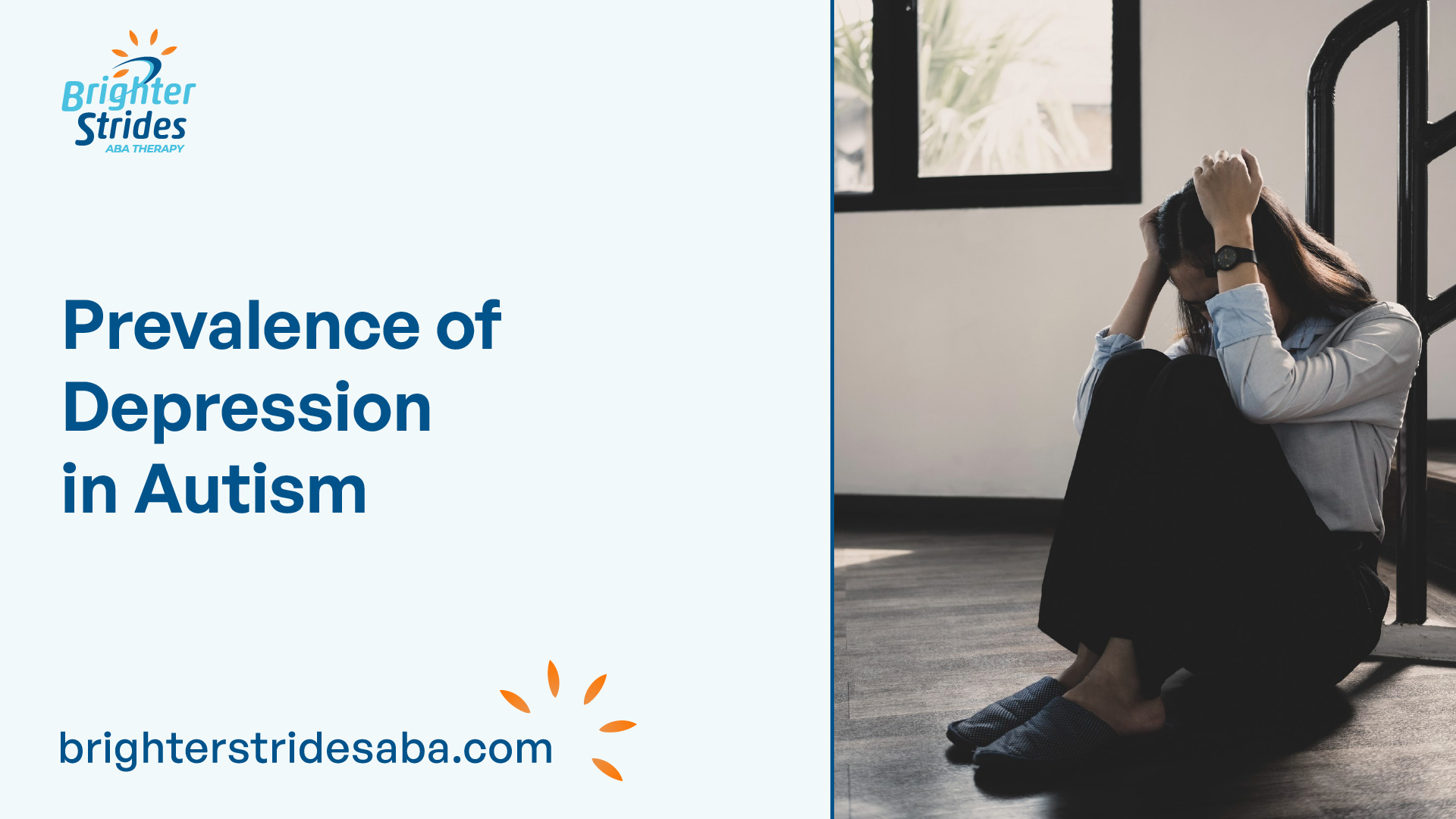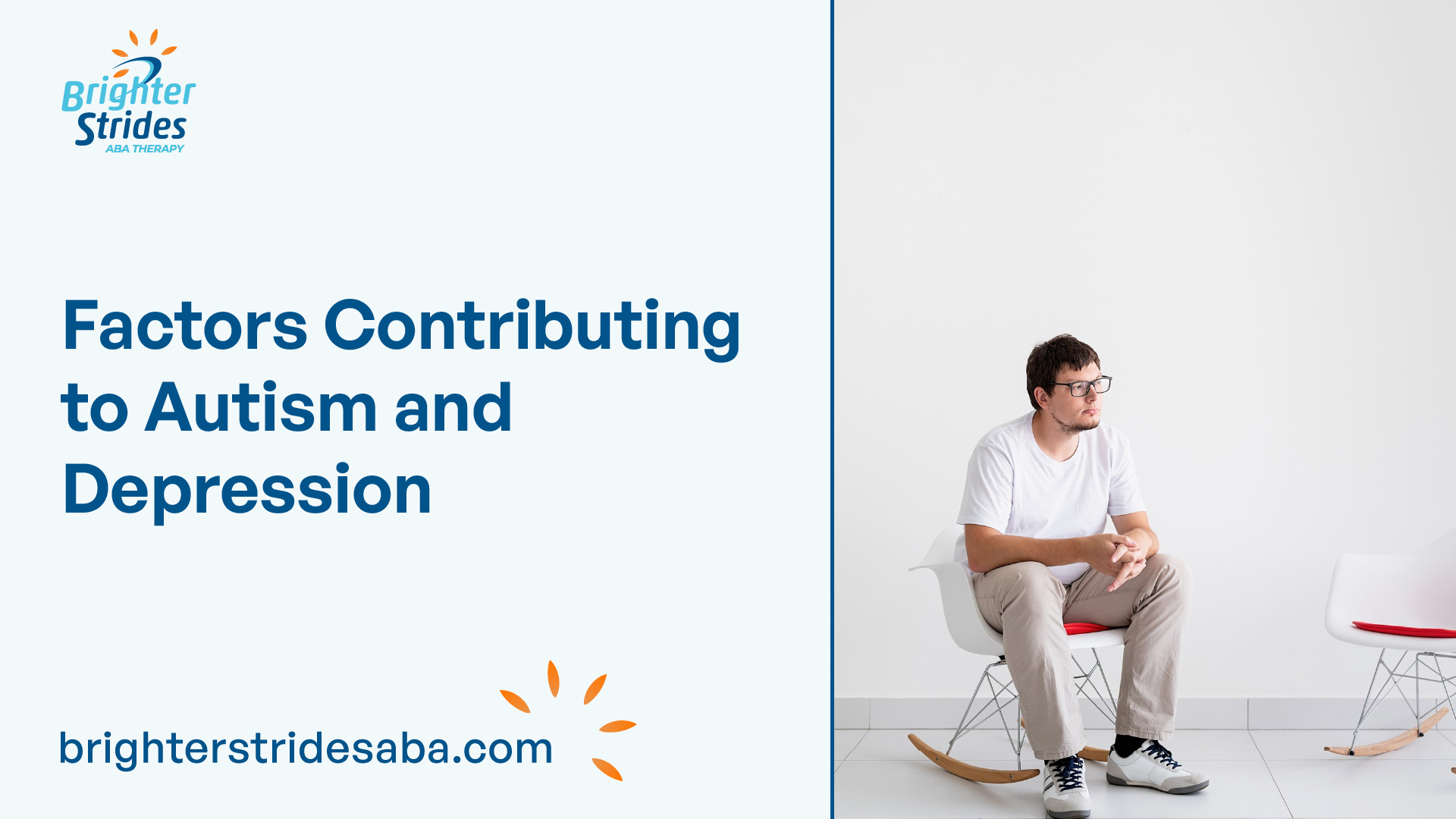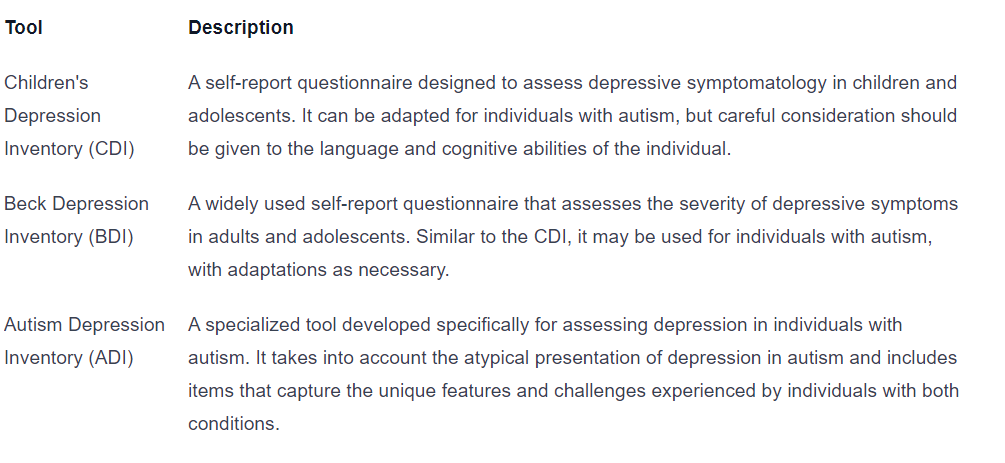
Understanding Autism and Depression
Autism and depression are conditions that often co-occur, presenting unique challenges for individuals facing both disorders. Recent studies have shown that the prevalence of a lifetime depression diagnosis among autistic adults can be as high as 40.2%. Understanding the co-occurrence and prevalence of depression in autism is essential for providing appropriate support and intervention.
The Co-Occurrence of Autism and Depression
Depression is one of the major concerns expressed by autistic adults when seeking mental health care services. Research suggests a relationship between autism and depression, as adults with a history of depression report a greater number of autistic traits compared to those without a history of depression. Autistic traits have also been associated with higher levels of depression symptoms, indicating a potential link between the two conditions.

Prevalence of Depression in Autism
The prevalence of depression in autistic individuals is higher compared to the general population. Research has shown that the prevalence of depression among autistic individuals can range from 7% to 72%. A study found that 26% of autistic individuals had depression, compared to 2% in the general population. These findings highlight the increased vulnerability of individuals with autism to depression.
It is important to note that autistic individuals with depression may experience more severe symptoms compared to non-autistic individuals with depression. They may have more severe symptoms in the short term and face challenges in daily functioning. Additionally, they may benefit less from conventional treatments, emphasizing the need for tailored interventions.
The relationship between autism and depression is complex and not yet fully understood. It is hypothesized that both conditions may share biological and genetic mechanisms, contributing to the challenges in diagnosis and treatment. The social difficulties, communication challenges, and sensory sensitivities common in autism may also contribute to the development of depression, as they can lead to feelings of isolation and loneliness.
Recognizing the co-occurrence and prevalence of depression in autism is crucial for providing appropriate support, intervention, and improving the overall well-being of individuals with autism. Further research is necessary to gain a deeper understanding of the underlying causes and develop effective strategies to address both autism and depression simultaneously.

Factors Contributing to Autism and Depression
Several factors contribute to the co-occurrence of autism and depression. Understanding these factors is essential for comprehending the complex relationship between the two conditions and developing effective interventions and support strategies.
Social Challenges and Communication Difficulties
Social challenges and difficulties in communication are significant contributors to the link between autism and depression. Individuals with autism may experience difficulties in understanding and connecting with others, leading to feelings of isolation and loneliness. The struggle to navigate social interactions and comprehend social cues can increase the risk of depression in individuals with autism.
Sensory Sensitivities and Depression
Sensory sensitivities are another factor that can contribute to the development of depression in individuals with autism. Many individuals with autism experience hypersensitivity or hyposensitivity to sensory stimuli, such as light, sound, touch, or smell. These sensitivities can lead to increased stress and anxiety, which, in turn, can contribute to the development of depression.
Genetic and Biological Mechanisms
Genetic and biological mechanisms also play a role in the co-occurrence of autism and depression. Shared genetic factors and underlying biological processes may contribute to the increased risk of depression in individuals with autism. While the exact mechanisms are still being researched, understanding the genetic and biological foundations can provide valuable insights into the complex interplay between autism and depression.
By recognizing the impact of social challenges, communication difficulties, sensory sensitivities, and genetic and biological factors, we can gain a deeper understanding of the factors contributing to autism and depression. This understanding is crucial for developing tailored interventions and support strategies that address the unique needs of individuals with autism who also experience depression.
Unique Presentation of Depression in Autism
Depression in individuals with autism can present differently compared to depression in neurotypical individuals. It is important to recognize these unique presentations in order to provide accurate diagnosis and appropriate intervention. Two aspects to consider are the atypical symptoms of depression in autism and the impact of depression on daily functioning.
Atypical Symptoms of Depression in Autism
Symptoms of depression in individuals with autism may manifest in atypical ways. Instead of the typical signs of sadness and withdrawal, individuals with autism may exhibit increased irritability, aggression, self-injury, and other challenging behaviors. These behaviors may serve as a way for individuals with autism to communicate their distress [5]. Recognizing these atypical symptoms is crucial for early intervention and appropriate treatment. It allows healthcare professionals and caregivers to identify depression and provide the necessary support and interventions.
Impact of Depression on Daily Functioning
Depression can significantly impact the daily functioning of individuals with autism. The presence of depressive symptoms can exacerbate existing challenges related to social interactions, communication difficulties, and sensory sensitivities. Depression may intensify social withdrawal, impair communication skills, and heighten sensory sensitivities, leading to increased distress and reduced quality of life.
Moreover, depression can further hinder individuals with autism in areas such as academic performance, personal relationships, and overall well-being. It is important to address and treat depression in individuals with autism to help improve their overall functioning and enhance their ability to cope with the challenges they face.
Understanding and recognizing the unique presentation of depression in autism is crucial for accurate diagnosis and appropriate intervention. By being aware of the atypical symptoms and the impact on daily functioning, healthcare professionals and caregivers can provide the necessary support and ensure individuals with autism receive the help they need to overcome depression and improve their overall well-being.
Diagnosis and Assessment of Depression in Autism
When it comes to diagnosing and assessing depression in individuals with autism, there are several unique challenges to consider. Due to the co-occurrence of autism and depression, it can be difficult to differentiate between symptoms that are characteristic of autism and those specific to depression. Let’s explore the challenges in diagnosing depression in autism and the screening and assessment tools used to identify this comorbidity.
Challenges in Diagnosing Depression in Autism
Diagnosing depression in individuals with autism spectrum disorder (ASD) can be challenging due to various factors. Atypical presentations of depression in autism, such as masking of common depression symptoms by ASD features, make it harder to recognize and differentiate between the two conditions [6]. The lack of standardized diagnostic tools specifically designed for assessing depression in individuals with ASD further complicates the diagnostic process.
It is essential for healthcare professionals to have a comprehensive understanding of the unique manifestations of depression in individuals with autism to ensure accurate diagnosis and appropriate treatment.
Screening and Assessment Tools for Depression in Autism
Despite the challenges, there are screening and assessment tools available to aid in the identification of depression in individuals with autism. While these tools are not specific to autism, they can provide valuable insights when used in conjunction with clinical judgment and observations.
Here are some commonly used screening and assessment tools:

It is important to note that these tools should be used as a part of a comprehensive evaluation and should be interpreted by trained professionals who are knowledgeable about both autism and depression.
By utilizing these screening and assessment tools and considering the atypical symptoms of depression in autism, healthcare professionals can better identify and diagnose depression in individuals with autism. This is a crucial step towards providing appropriate support and interventions to improve their mental well-being and overall quality of life.
Risk Factors for Depression in Autism
When it comes to individuals with autism, the risk of experiencing depression is significantly higher compared to the general population. Understanding the risk factors associated with depression in autism is crucial for identifying and providing appropriate support. Here are two key factors that contribute to the risk of depression in individuals with autism: family history and negative life events, as well as the severity of autism and depression.
Family History and Negative Life Events
A family history of depression, even in second-degree relatives, appears to increase the risk of depression in individuals with autism. Additionally, major negative life events can significantly impact the mental well-being of individuals with autism, leading to an increased risk of depression. These events may include significant losses, transitions in caregivers, or changes in structure or activities.
Autism Severity and Depression Severity
Research suggests that there is a positive correlation between the severity of autism and the severity of depression in individuals with autism. This means that higher levels of autism severity are associated with more severe depression symptoms. The presence of multiple physical health problems in individuals with autism also contributes to an increased risk of depression.
It is important to note that the increased risk of depression in individuals with autism also impacts the likelihood of suicidal thoughts, plans, or actions. Autistic individuals are four times more likely to experience depression during their lifetime compared to the general population. Approximately 40% of autistic adults and 8% of autistic youth have had depression, underscoring the importance of addressing mental health concerns in this population.
Understanding these risk factors is crucial for early identification and intervention. By recognizing the potential impact of family history, negative life events, and the severity of autism and depression, appropriate support and treatments can be provided to individuals with autism who are at a higher risk of developing depression.
Treating Depression in Individuals with Autism
When it comes to treating depression in individuals with autism, a comprehensive approach that takes into consideration the unique needs of each individual is crucial. This section will explore various treatment options, including traditional treatments and adjustments for autism, non-drug therapies like Cognitive Behavioral Therapy (CBT) and Mindfulness Therapy, as well as medication considerations.
Traditional Treatments and Adjustments for Autism
Traditional treatments for depression, such as psychotherapy and medication, can be effective for individuals with autism. However, adjustments may be necessary due to potential side effects and the specific challenges associated with autism. For example, certain antidepressants, like Selective Serotonin Reuptake Inhibitors (SSRIs), may cause impulsive or irritable behavior and trouble sleeping in some individuals with autism. Close monitoring and caution are required when prescribing antidepressants to individuals with autism, as there is a risk of side effects such as an increase in suicidal thoughts and behaviors.
Non-Drug Therapies: Cognitive Behavioral Therapy (CBT) and Mindfulness Therapy
Non-drug therapies, such as Cognitive Behavioral Therapy (CBT), have shown promise in treating depression and anxiety in individuals with autism. CBT can be modified to be more effective for individuals with autism by using concrete language, incorporating special interests, and addressing unhelpful thoughts and behaviors. Studies have indicated that CBT programs tailored for individuals with autism can lead to a decrease in symptoms of depression and stress [8].
Mindfulness therapy, adapted for individuals with autism, has also been found to be beneficial in reducing symptoms of depression and anxiety. This therapy involves teaching individuals to pay attention to experiences in the present moment in a nonjudgmental way, incorporating breathing exercises and meditation sessions. However, it’s important to note that studies on mindfulness therapy for individuals with autism have typically excluded those with intellectual disabilities or limited speech, leaving uncertainty about its efficacy for these populations.
Medication Considerations for Depression in Autism
Medication, such as antidepressants or mood stabilizers, may be prescribed to manage depression in individuals with autism. Some research studies have reported improvements in low mood, sleep disturbance, and self-harm in autistic individuals using medication. It’s important to recognize that individuals with autism may respond differently to medication compared to those without autism. Close monitoring and regular communication with healthcare professionals are essential to determine the most appropriate medication and dosage, as well as to manage any potential side effects or interactions.
Treating depression in individuals with autism requires a personalized approach that considers the specific needs and challenges associated with autism. Effective assessment and treatment may involve a multidisciplinary approach, including behavioral therapy, pharmacological interventions, and social supports. Tailoring interventions to the unique needs of individuals with autism is essential for successful outcomes.
Early Intervention and Support for Autism and Depression
Early identification and intervention for depression in individuals with autism play a vital role in preventing long-term negative consequences on their well-being and overall quality of life. Collaborative efforts between healthcare providers, educators, caregivers, and individuals with autism are crucial in addressing the unique mental health needs of this population and promoting positive outcomes.
Importance of Early Identification and Intervention
Early intervention is critical when it comes to addressing depression in individuals with autism. Identifying and addressing depression in its early stages can help prevent long-term negative impacts on their well-being and daily functioning. Early intervention may involve a combination of psychotherapy, behavioral interventions, and pharmacological treatments tailored to the specific needs of individuals with autism.
Multidisciplinary Approach for Improved Outcomes
Effective assessment and treatment of depression in individuals with autism often require a multidisciplinary approach. This approach involves collaboration between healthcare providers, educators, and caregivers to provide comprehensive support and interventions. By combining behavioral therapy, pharmacological interventions, and social supports, individuals with autism can experience improved outcomes and a better quality of life [3].
A multidisciplinary team may include professionals such as psychologists, psychiatrists, therapists, special educators, and social workers. This collaborative approach ensures that various aspects of an individual’s mental health and well-being are addressed, taking into account their unique needs and challenges.
Support for Caregivers of Individuals with Autism
Support for caregivers of individuals with autism is crucial in ensuring the holistic well-being of both the individual with autism and their caregivers. Caregivers play a vital role in providing care, support, and advocacy for individuals with autism who may also be dealing with depression. It is essential to provide appropriate support and resources to help caregivers navigate the challenges associated with autism and depression effectively. This can include access to support groups, counseling services, respite care, and educational resources.
By recognizing the importance of early intervention and adopting a multidisciplinary approach, individuals with autism and depression can receive the necessary support to improve their mental health and quality of life. Additionally, providing support for caregivers ensures they have the resources and assistance needed to care for their loved ones effectively.
References
- https://docs.github.com/en/get-started/writing-on-github/working-with-advanced-formatting/creating-and-highlighting-code-blocks
- https://www.ncbi.nlm.nih.gov/pmc/articles/PMC7168804/
- https://www.autismspeaks.org/expert-opinion/autism-depression
- https://www.medicalnewstoday.com/articles/autistic-depression
- https://www.autistica.org.uk/what-is-autism/signs-and-symptoms/depression-and-autism
- https://www.ncbi.nlm.nih.gov/pmc/articles/PMC4518704/
- https://pubmed.ncbi.nlm.nih.gov/29497980/
- https://sparkforautism.org/discover_article/treating-depression-autism/

 We've just released an article!
Check out our blog!
We've just released an article!
Check out our blog!



